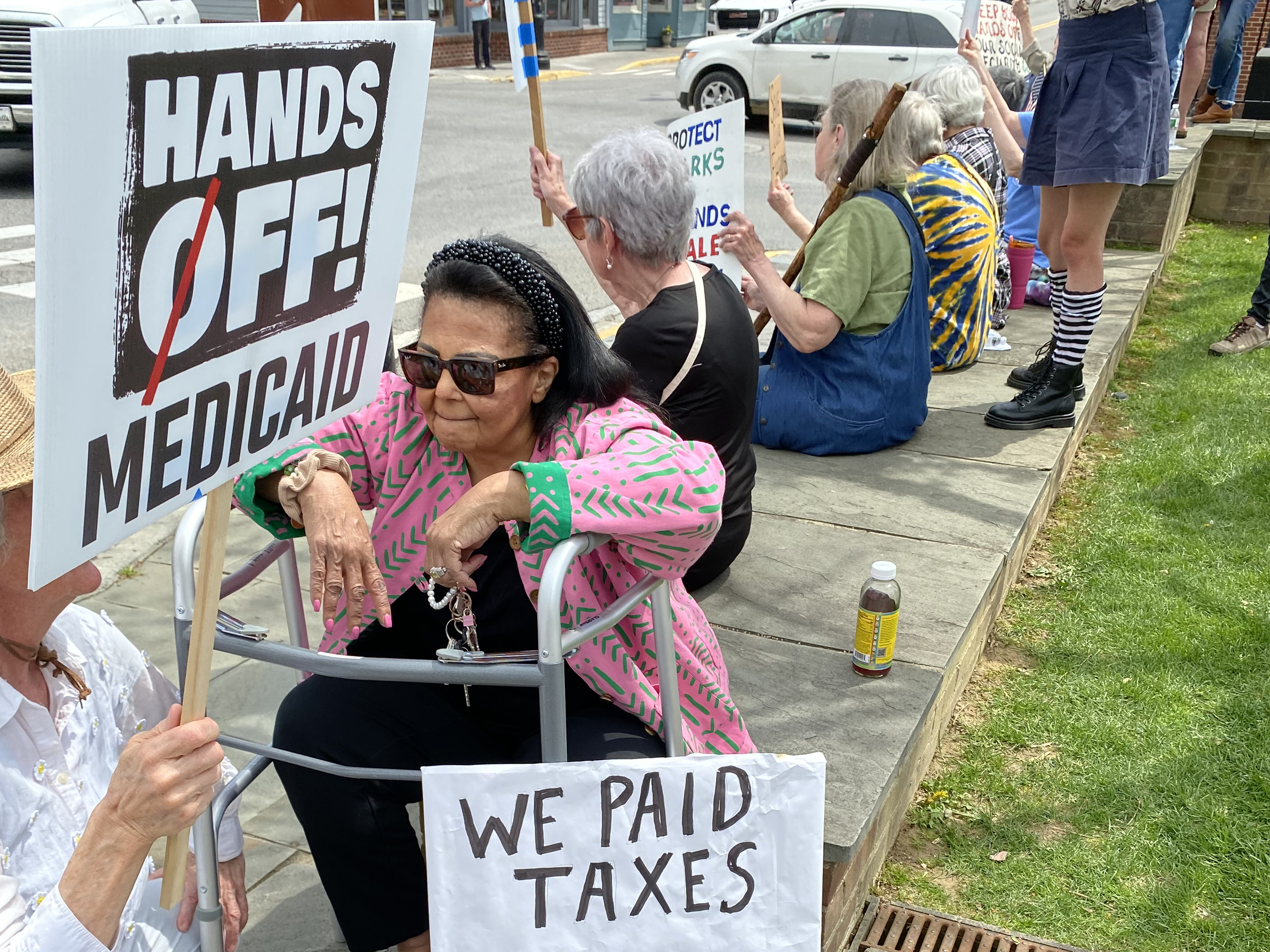
Loretta Young, President of NAACP WV State Chapter, at a rally in downtown Lewisburg, WV Lyn MacCorkle
British author and poet George Orwell wrote in his 1946 essay Politics and the English Language, “In our time, political speech and writing are largely the defense of the indefensible.”
While confronting the monstrosity of the so-called “big beautiful bill” that recently passed the House of Representatives, one might imagine Orwell hollering at us from the past, “Did I call it or what?”
If this bill didn’t have life or death implications for millions of Americans, we could almost laugh at the recent image of moneyed politicians, victorious after the bill narrowly passed the House, their pockets lined with corporate cash, standing behind a sign that reads: “One Big Beautiful Bill Act.”
But nothing funny nor beautiful can be found in a bill that adds trillions of dollars to the national debt, strips health care and food assistance away from millions of Americans, all to pay for an extension of tax cuts, the lion’s share of which benefit the wealthiest one per cent.
How could we be fooled into not seeing that this budget bill is what economics columnist for the Washington Post Catherine Rampell calls “a transfer of wealth from the poor to the rich”?
At over 1,000 pages, I’ll concede that the bill is big, which is by design. The sheer volume of it, the number of programs and tax policies it touches makes it difficult for most of us to understand all the implications of a budget bill this size. My friend and colleague with American Friends Service Committee Rick Wilson has often quipped, “Taxes and budgets are boring. Breathing is boring too until someone starts choking you, in which case it’s fascinating.”
We should be fascinated—and equally horrified—by what is in this bill. According to Urban-Brookings Tax Policy Center, two-thirds of the proposal’s tax cuts benefit only those earners in the top quintile of income brackets.
Cuts to the corporate tax rate, which decreased from 35 per cent to 21 per cent after the tax cuts were originally passed in 2017, would be made permanent.
Those corporate tax cuts have helped drain our federal coffers. From 2018 to 2021, according to an analysis from the Institute on Taxation and Economic Policy, the top corporations in the U.S. saved a combined $240 billion in taxes.
This massive transfer of wealth from the poor to the rich is made plain by the fact that the tax cuts would be paid for largely by cutting people off Medicaid and SNAP.
Words like “waste, fraud and abuse” hide the bill’s true aims. Stereotypes of an unworthy poor person are updated. President Ronald Reagan used the racialized trope of “welfare queen” to defend welfare reform in the 1980s. Today Speaker Mike Johnson describes “29 year old males sitting on their couch playing video games” to gin up anti-poor resentments and peddle the myth that food and health care are luxuries only for those who are deserving.
Political dog whistles are used to support radical changes to the Medicaid program via “Medicaid work requirements” that would, by design, drown people in bureaucratic paperwork. Quite cynically those who support this bill are not hiding the math: the tax cuts will be offset in part by the number of people projected to be cut off Medicaid.
The Congressional Budget Office’s latest cost estimate shows that the Medicaid provisions would increase the number of uninsured people by 7.6 million. Over 90,000 people in West Virginia would eventually lose health care coverage.
When Arkansas instituted work reporting requirements, more than 18,000 people lost Medicaid coverage, mainly due to failure to regularly report work status or document eligibility for an exemption.
The hypocrisy of the proposed reporting requirements is staggering. As New York Times columnist Ezra Klein points out, so-called work requirements are “an effort to weaponize the very bureaucratic inefficiency that they otherwise pretend to condemn and root out—against the weakest and most powerless segment of society: people who do not make enough money to get health insurance.”
“Medicaid work requirements” sound good which again is by design. The language obscures the fact that two thirds of people who receive Medicaid via expansion under the Affordable Care Act are already working full or part time. The other third of people are not working due to caregiving responsibilities, unaffordable child care, or any number of life complications that crop up, particularly when facing economic hardship every single day.
Orwell concludes in his essay on politics and language, “One cannot change this all in a moment, but one can at least change one’s own habits, and from time to time one can even, if one jeers loudly enough, send some worn-out and useless phrase into the dustbin where it belongs.”
I surely hope that the better and wiser angels of our nature carry the day, and that we all jeer loudly enough to send the “one big beautiful bill” into the dustbin where it belongs.
Lida Shepherd
WV Economic Justice Director
This piece by was originally published on June 3, 2025 in the Charleston Gazette-Mail.
Learn more about AFSC's West Virginia Economic Justice Project.